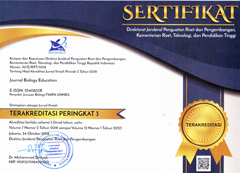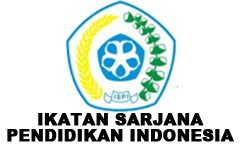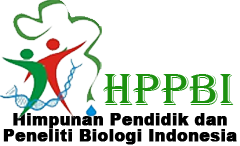PENUGASAN RISET MINI DENGAN STRATEGI METAKOGNITIF DALAM PEMBELAJARAN SISTEM PEREDARAN DARAH
Abstract
Penelitian ini bertujuan untuk mengetahui pengaruh penugasan riset mini dengan strategi metakognitif terhadap kemampuan metakognitif siswa. Dalam penelitian ini peneliti berusaha menggabungkan strategi yang mampu mencakup kognisi dan metakognisi dalam upaya melatih pembelajaran mandiri. Penelitian ini merupakan penelitian quasi-experimental design dengan rancangan posttest-only design. Penelitian dilaksanakan pada semester gasal tahun ajaran 2014/2015 di SMA 1 Gombong pada kelas XI dengan materi sistem peredaran darah. Pengambilan sampel dilakukan menggunakan teknik acak dan diperoleh tiga kelas, dua kelas eksperimen dan satu kelas kontrol. Hasil penelitian meliputi tingkat keterlaksanaan penugasan riset mini dengan strategi metakognitif, hasil belajar siswa, skor kemampuan metakognitif siswa, dan hubungan antara hasil belajar dan kemampuan metakognitif. Hasil uji t test posttest diperoleh thitung (4,442) > ttabel (1,985) sehingga dapat disimpulkan bahwa penugasan riset mini dengan strategi metakognitif berpengaruh terhadap hasil belajar. Di sisi lain, korelasi antara hasil belajar dan kemampuan metakognitif belum menunjukkan hubungan yang signifikan.
Â
Â
This research aimed to determine the effect of mini research assignment with metacognitive strategies upon students' metacognitive skills. During the study, a strategy for improving both cognition and metacognition was used to support student self-regulated learning. Quasi-experimental design with posttest-only design was implemented, in the first semester of academic year 2014/2015 at Senior High School 1 Gombong, in which class XI students were studying circulatory system. Random sampling techniques were implemented to indentify three classes, two experimental classes and one control class. Findings included level scores of mini research assignment with metacognitive strategies, of student learning outcomes, of student metacognitive skills, and the relationship between learning outcomes and metacognitive skills. t-test posttest indicated that tcount (4.442) > ttable (1.985) and it was concluded that mini research assignment with metacognitive strategies could influence on learning outcomes. On the other hand, the correlation between learning outcomes and metacognitive skills was not positively strong.
References
Bossche P Van den, Gijselaers WH, Segers M, Kirschner PA. 2006. Social and Cognitive Factors Driving Teamwork in Collaborative Learning Environments: Team Learning Beliefs and Behaviors. Small Group Research 37(5):490-521.
Coutinho SA. 2007. The Relationship Between Goals, Metacognition, and Academic Success. Educate 7(1):39-47.
Fernate A, Surikova S, Kalnina D, Romero CS. 2009. Research-Based Academic Studies: Promotion of the Quality of Learning Outcomes in Higher Education? The European Conference on Educational Research; University of Vienna, 28-30 Sept 2009. Vienna: EDUCATION-LINE. 2009. hlm 1-23.
Hidayat AF. 2013. Hubungan Regulasi Diri dengan Prestasi Belajar Kalkulus II Ditinjau dari aspek metakognisi, motivasi, dan perilaku. Jurnal Elektronik Pendidikan Matematika Tadulako 1(1):1-8.
Iin Y, Sugiarto B. 2012. Korelasi antara Keterampilan Metakognitif dengan Hasil Belajar Siswa di SMAN 1 Dawarblandong Mojokerto. Unesa Journal of Chemical Education 1(2):78-83.
Jayapraba G. 2013. Metacognitive Instruction and Cooperative Learning-Strategies for Promoting Insightful Learning in Science. International Journal on New Trends in Education and Their Implications 4(1):165-172.
Landine J, Stewart J. 1998. Relationship Between Metacognition, Motivation, Locus of Control, Self-Efficacy, and Academic Achievement. Canadian Journal of Counselling 32(3):200-212.
Schraw G, Crippen KJ, Hartley K. 2006. Promoting Self-Regulation in Science Education: Metacognition as Part of a Broader Perspective on Learning. Research in Science Education 36:111–139.
Tella A. 2007. The Impact of Motivation on Student’s Academic Achievement and Learning Outcomes in Mathematics among Secondary School Students in Nigeria. Eurasia Journal of Mathematics, Science & Technology Education 3(2):149-156.
The copyright of the article once it is accepted for publication shall be assigned to the journal as the publisher. The intended copyright includes the right to publish the article in various forms (including reprints). The journal maintains the publishing rights to the published articles.
This work is licensed under a Creative Commons Attribution 4.0 International License.







